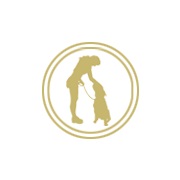Privacy Policy: Your email address is 100% safe.
We don't spam and hate it as much as you do :-) You can also unsubscribe from our mailing list at any time.
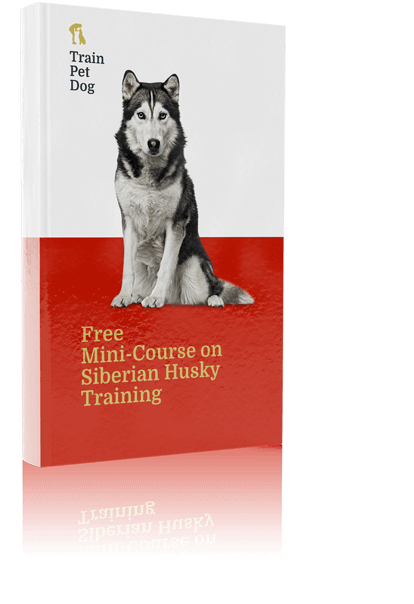
Sign Up
Siberian Husky: Training, Breed Personality, Fitness & Care (Husky, Sibe)
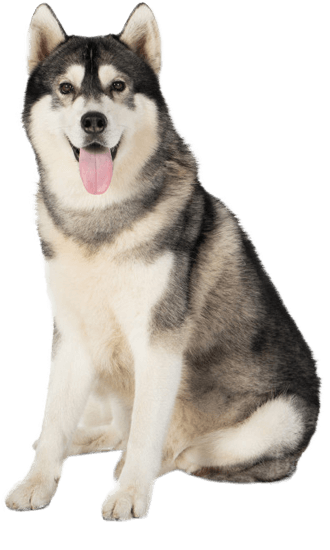
Country of Origin, History of Siberian Huskys
A native of Siberia, the Husky was brought to Alaska in 1909. The Chukchi people in Siberia had used them for centuries to pull sleds, herd reindeer, and do watchdogging. The Siberian Husky was brought to North America by fur traders in Malamute for arctic races because of their great speed.
The Husky went with Admiral Byrd’s expeditions to the pole. The Husky is an excellent pack animal and gets along well with other dogs. They are known for their endurance and ability to adapt. He is a light-weight sled dog with great stamina.
Siberian Huskies have been used for sledding, carting, and racing.
Siberian Husky Tools
Breed Selector Tool - is the Siberian Husky the right breed for you?
Is the Siberian Husky the right breed for you and your family?
Find out by using our Free Dog Breed Selector Tool
Check Your Siberian Husky's Learning Style
Are you aware dogs also have a learning style that can greatly affect their ability to housetrain as well as be trained correctly. Evaluate your Siberian Husky's learning style and personality using our free Learning Style tool so that you are better able to provide him with the proper Siberian Husky training methods.
Is your Siberian Husky dominating over you?
Does your Siberian Husky bark unnecessarily? Does your Siberian Husky come to you when you call? Download a FREE Report on Dog Dominance for you and your Siberian Husky and learn how to control your dog.
Do you make these mistakes with your Siberian Husky?
Are you inadvertently snow-balling bad behavior in your Siberian Husky? Evaluate your Dog Training Style from our Free Tool and learn how best to deal with your dog.
Siberian Husky Calorie Calculator
Do you know how many calories your Siberian Husky needs every day and how many cups of food you should be giving it every day? Click here to use our Siberian Husky Calorie Calculator.

A General Appearance of the Dog
The Siberian Husky is a medium-sized working dog who is quick and light on his feet. (He is smaller than the Alaskan Malamute.) His reasonably compact body is well-covered with protective fur. His head is broad with triangular, erect ears.
A Siberian Husky has a sickle-shaped brush tail, unlike the Alaskan Malamute who has a curved-over-the-back tail. The Husky’s face can either be all white or marked with a bar or mask. He appears proud, well-built, strong, and steady.
The feet are furry for gripping on ice and have very tough pads. Brown eyes, blue eyes, amber eyes or eyes of two different colors are acceptable. His alert, almost mischievous expression also indicates the boundless energy he possesses.
Coat Color
Husky coat colors have a tremendous variety. From jet black to white and all shades of gray, light peach to red-orange, chocolate brown, wolf-gray, and Agouti which is coyote colored, the Husky can also have many different markings. Typically the face mask and underbody are white.
Coat Type
The coat of the Siberian Husky is double and medium in length, giving a well furred appearance. The undercoat is soft and dense and of sufficient length to support the outer coat. The guard hairs of the outer coat are straight and smooth. The Siberian Husky can withstand temperatures as low as -58 to -76 degrees F (-50 to -60 degrees C).
Weight
Males: 45 - 60 lbs
Females: 35 - 50 lbs
Height
Males: 21 -23.5 inches
Females: 20-22 inches
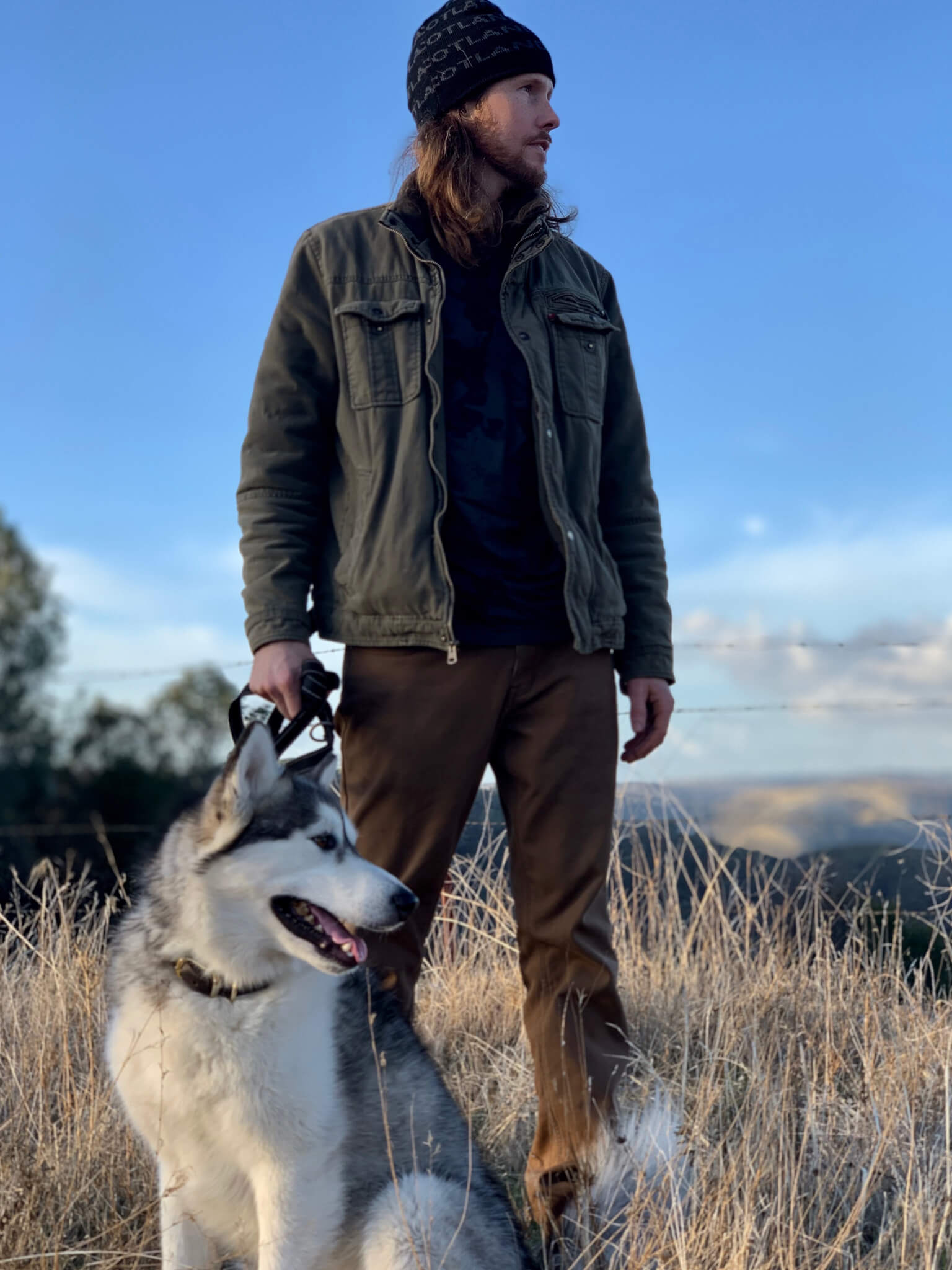


Free Siberian Husky Training Secrets
Free Course on Siberian Husky Training & Obedience
Stop All Bad Behavior, Excessive Barking and Biting
Siberian Husky Personality Traits
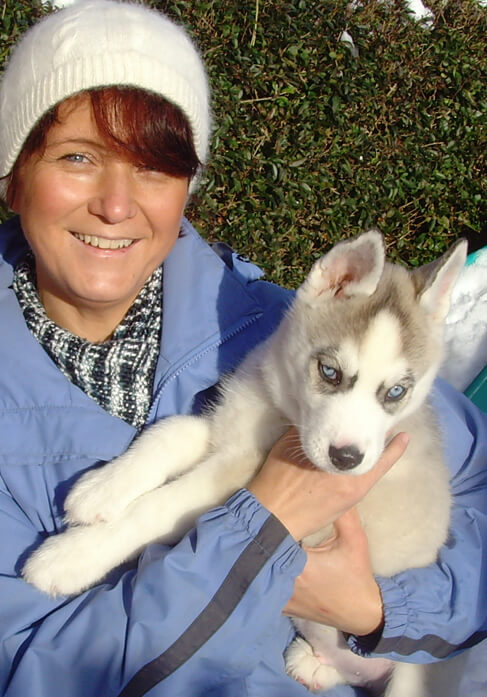
Temperament and Traits of the Siberian Husky
The energetic Siberian Husky youngster is always ready to play. Happy and affectionate, they are good with older children.
Adult Huskys are quieter and more dignified; however, they remain active indoors and outdoors. Males are very dominant.
Huskys need plenty of attention and early, firm training to keep them from becoming destructive when they need to be left alone. It is recommended that if your dog will be alone, you will want another dog for companionship as a single dog left alone will be quite destructive as a result of boredom.
Huskys may be slow with housebreaking because they are primarily an outdoor dog. Socialization needs to start early. If you want your Husky to get along with cats or other small animals, introduce them when he is a puppy. It is not hard to teach Huskys to be well-mannered since they love to please.
Formal obedience training is important for this breed, but they may be difficult and need a firm hand. They can be stubborn. They must see the point of what you are telling them and they get bored easily with long training sessions or repetition and simply quit obeying.
The Siberian Husky does not need as much food as you might think.
Better suited to an indoor or outdoor lifestyle?
The Siberian Husky loves to be outdoors, especially in cool weather. In hot weather he needs to be in the air conditioning. He loves a large yard and is not suited to apartment living. Make sure the fencing is tall and the base of it is buried. If in an appropriate climate, he is happy to live outdoors as long as he gets plenty of “people time” with his human pack members. Companionship and pack time are important to them.
Outdoor games and activities that you and your Husky can do together will make him happy.
Siberian Huskies like to roam, so be sure they are safe in a secured area.
Are they suited to homes with kids?
Huskies do well in homes with children.
Siberian Husky Activity Level
How Active is the Breed?
Siberian Huskies are a fairly active breed. They love to play. They desire a long walk each day at the very least, but cannot do much in hot weather. Make sure they have shade and cool water to drink if the weather is warm. They love cool and cold weather.
How Much Exercise Does the Dog Need at every stage of its Life?
The Siberian Husky is not recommended
for apartment living. They love to play both indoors
and outdoors. They have a lot of energy. They like
to play all types of games.
A secure, tall fence with the base buried is necessary
for the Husky.
This is a pack breed, so he enjoys going to a dog park to play with other dogs.
Grooming
The Siberian Husky will require some brushing. He does shed heavily twice a year.


Free Siberian Husky Training Secrets
Free Course on Siberian Husky Training & Obedience
Stop All Bad Behavior, Excessive Barking and Biting
Health and Care
Feed a couple of small meals a day. They do not need as much food as you would expect.
Genetic Problems
They are prone to hip dysplasia and some eye problems like cataracts and PRA and corneal dystrophy). Some clubs require OFA and CERF certification of both parents. Huskies also sometimes have zinc responsive dermatitis (a skin condition which improves with giving zinc supplements).
Litter Size: Litters average 6 puppies.
Life Span: Siberian Huskies live 12-15 years.
National Breed Clubs
National Breed Clubs
British – The Siberian Husky
Club of Great Britain – www.siberianhuskyclub.com
US – Siberian Husky Club of America - www.shca.org
Other Recognition: FCI, AKC, UKC, KCGB, CKC, NKC, NZKC, CKC, APRI, ACR, ANKC
Rescue Link: www.siberianrescue.com
Group: AKC Working Group, KCGB Working Group
AKC Popularity Ranking: 14
Train Your Siberian Husky To Listen To You
Get Instant Access to Your Training Now - For Free
Sign up for our Free Siberian Husky Mini Course to have a housebroken, obedient dog that happily comes to you every time you call.
You'll learn new commands to obedience-train your dog as well as how to housebreak your dog in 6 days or less.
You'll also learn how to eliminate bad habits like barking, nipping or biting, jumping, or pulling on the leash.Here's just s small fraction of what else you'll learn in the course:
How to lead and think like a pack dog - the new psychology.
3 dangerous mistakes that most Husky owners make when they are trying to potty train their dogs.
The 2 main reasons why your dog barks excessively and how to control its excessive barking.
How to obedience train your Siberian Husky to permanently end behavioral problems like Jumping, Aggression, Pulling on Leash.
A surprisingly easy way to teach your dog cool new tricks.
How to improve your dog's lifespan and keep it from getting overly heavy with a healthy and nutritious diet.
Getting Pro help fast - how to get access to our expert trainers when you need them most.
One hidden psychological trigger that all Siberian Huskys have... that practically allows you to "analyze" and "control" your dog's every action.
Priority access to the free online seminars conducted by our training experts.
Whereas other dog training related web sites and books offer generic information for dogs in general, ours is the ONLY web site that offers Husky information specifically, from a renowned panel of experts - because as you probably know, Huskys have their own special training requirements that other dogs don't have.
Our Dog Experts
The Siberian Husky training information you will read here was developed by a panel of renowned dog training experts whose combined wisdom represents nearly 100 years of specialist experience training dogs.
Here are a few of our experts:




